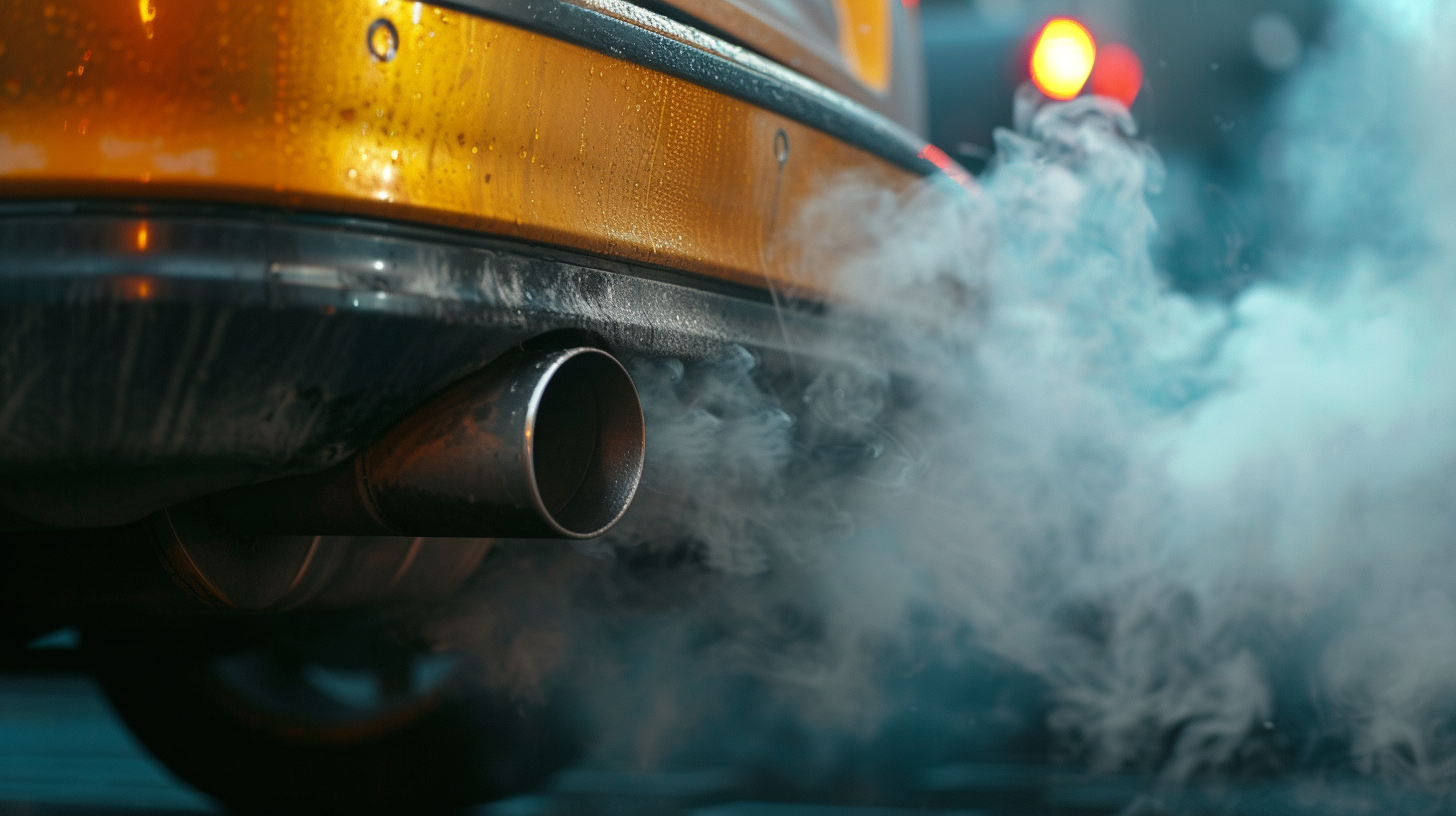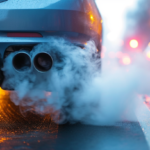Are you concerned about the smoke coming out of your car’s exhaust? Don’t worry, diagnosing and fixing the issue is easier than you think. In this article, we will guide you through the different colors of car exhaust smoke and help you identify and resolve the underlying problems. From white smoke to black, blue, and gray, we’ll show you how to tackle each issue effectively. With our tips, you’ll be able to keep your car running smoothly and smoke-free.
Understanding the Different Colors of Car Exhaust Smoke
You should be aware of the different colors of car exhaust smoke and what they can indicate about your vehicle’s condition. When you see white smoke coming out of your exhaust, it could mean that there is a coolant leak in the engine, which may be a sign of a blown head gasket or a cracked engine block. Blue smoke, on the other hand, is often an indication of burning oil. This could be caused by worn piston rings, valve seals, or a faulty PCV valve. Black smoke is usually a result of an overly rich fuel mixture, which can be caused by a clogged air filter, a malfunctioning fuel injector, or a faulty oxygen sensor. Being able to identify and understand the different colors of car exhaust smoke can help you diagnose potential issues with your vehicle and take appropriate action to fix them.
Diagnosing White Smoke From Car Exhaust
When diagnosing white smoke from your car exhaust, pay attention to the smell and consistency of the smoke to determine the possible causes. White smoke usually indicates a coolant leak or a problem with the engine’s combustion process. If the smoke has a sweet smell and is accompanied by a loss of coolant, it is likely that there is a coolant leak. This could be caused by a leaking head gasket, a cracked engine block, or a damaged cylinder head. On the other hand, if the smoke has a burnt smell and is accompanied by a loss of oil, it could be an indication of a worn piston ring or a malfunctioning PCV valve. In either case, it is important to have your vehicle inspected by a qualified mechanic to determine the exact cause and to prevent further damage.
Fixing Blue Smoke From Car Exhaust
If you notice a significant amount of blue smoke coming from your car exhaust, it is likely that you have an issue with oil consumption. Blue smoke is typically a sign that oil is being burned in the combustion process. There are a few potential causes for this issue. One possibility is worn piston rings, which allow oil to leak into the combustion chamber and burn along with the fuel. Another potential cause is a faulty PCV valve, which can lead to excessive oil consumption. Additionally, a clogged or malfunctioning catalytic converter can cause oil to burn and produce blue smoke. To fix this issue, it is important to address the underlying cause. This may involve replacing worn piston rings, fixing or replacing the PCV valve, or cleaning or replacing the catalytic converter.
Identifying Causes of Black Smoke From Car Exhaust
Now let’s talk about the causes of black smoke coming from your car’s exhaust. There are a few potential culprits for this issue. Firstly, a rich fuel mixture could be the cause, meaning there is too much fuel and not enough air in the combustion process. Another possibility is engine oil burning, which can occur due to worn-out piston rings or valve seals. Lastly, faulty fuel injectors could be spraying too much fuel into the combustion chamber, resulting in black smoke.
Rich Fuel Mixture
You can identify and fix a rich fuel mixture by understanding the causes of black smoke coming from your car’s exhaust. A rich fuel mixture occurs when there is an excess amount of fuel being injected into the combustion chamber compared to the amount of air. This imbalance can lead to incomplete combustion, resulting in the production of black smoke. There are several possible causes for a rich fuel mixture, including a faulty oxygen sensor, a clogged air filter, a malfunctioning fuel pressure regulator, or a dirty or malfunctioning fuel injector. To diagnose the issue, you can start by checking the oxygen sensor and the air filter for any signs of damage or clogging. If these components are in good condition, it may be necessary to have a professional mechanic inspect and clean or repair the fuel pressure regulator or fuel injectors. By addressing the underlying cause of the rich fuel mixture, you can reduce or eliminate the black smoke coming from your car’s exhaust.
Engine Oil Burning
One common cause of black smoke from your car’s exhaust is frequently due to engine oil burning. When engine oil is burned, it produces thick, black smoke that is often accompanied by a strong smell. There are several reasons why this may be happening. One possibility is that the piston rings are worn out or damaged, causing oil to leak into the combustion chamber. Another potential cause is a faulty valve seal, which allows oil to enter the intake manifold and get burned along with the fuel. Additionally, a clogged or malfunctioning PCV valve can lead to oil buildup in the engine and result in oil burning. It is important to address this issue promptly, as continued oil burning can cause further damage to the engine and negatively impact its performance.
Faulty Fuel Injectors
If your car’s exhaust is emitting black smoke, a possible cause could be faulty fuel injectors. Fuel injectors are responsible for delivering the right amount of fuel to the engine’s combustion chamber. When they become faulty, they can spray too much fuel into the chamber, resulting in an overly rich fuel-air mixture. This excess fuel does not burn completely during the combustion process and is released as black smoke through the exhaust pipe. Faulty fuel injectors can be caused by a variety of factors, including clogging due to dirt or debris, electrical issues, or internal component failure. If you suspect that your fuel injectors are the cause of the black smoke, it is recommended to have them inspected and replaced if necessary by a qualified mechanic.
Resolving Gray Smoke From Car Exhaust
To effectively resolve the issue of gray smoke coming from your car’s exhaust, it is important to promptly address any underlying mechanical problems. Gray smoke usually indicates that oil is being burned in the engine, which can be caused by a variety of issues. One common culprit is a worn-out piston ring, which allows oil to leak into the combustion chamber and be burned along with the fuel. Another possibility is a malfunctioning PCV valve, which can cause excessive oil consumption and result in gray smoke. Additionally, a clogged or faulty turbocharger can also lead to the production of gray smoke. It is crucial to have a qualified mechanic inspect your car to accurately diagnose the problem and determine the necessary repairs. Ignoring the issue can lead to further damage and costly repairs down the line.
Dealing With Excessive Smoke From Car Exhaust
If you notice excessive smoke coming from your car’s exhaust, it is important to take immediate action. Excessive smoke can indicate a serious problem with your vehicle that needs to be addressed as soon as possible. The color of the smoke can provide clues about the underlying issue. If you see white smoke, it could be a sign of a coolant leak, which may be caused by a blown head gasket or a cracked engine block. Blue smoke, on the other hand, could indicate an oil leak, potentially caused by worn piston rings or valve seals. Black smoke is often associated with a rich fuel mixture, which can be caused by a faulty fuel injector or a clogged air filter. Regardless of the color, it is crucial to have your car inspected and repaired by a qualified mechanic to prevent further damage and ensure your safety on the road.
Checking for Oil Leaks in Car Exhaust
When checking for oil leaks in your car exhaust, look for any visible signs of oil residue or drips. Oil leaks in the exhaust system can be a sign of a serious issue with your vehicle. Start by inspecting the area around the exhaust pipes and muffler. Look for any black, greasy stains or puddles of oil. You may also notice a strong, burning oil smell coming from the exhaust. Another indication of an oil leak is excessive smoke coming out of the tailpipe. If you notice any of these signs, it is important to address the issue promptly. Oil leaks can lead to engine damage and poor performance. Take your car to a professional mechanic to diagnose and fix the problem.
Addressing Coolant Leaks in Car Exhaust
Check for any visible signs of coolant leaks in your car exhaust, such as white smoke or a sweet, pungent smell. Coolant leaks in the exhaust system can indicate a problem with the head gasket or a cracked cylinder head. When the head gasket fails, coolant can leak into the combustion chamber, resulting in white smoke coming out of the tailpipe. This smoke may have a sweet smell due to the presence of ethylene glycol in the coolant. It is important to address coolant leaks in the exhaust promptly, as they can lead to engine overheating and damage. If you notice any of these signs, it is recommended to have your vehicle inspected by a qualified mechanic to determine the cause of the coolant leak and make the necessary repairs.
Inspecting the Catalytic Converter for Issues
Before inspecting the catalytic converter for issues, you should ensure that the engine is completely cool and the vehicle is parked on a flat surface. This is important to prevent any accidents or injuries. Once you have taken these precautions, you can proceed with inspecting the catalytic converter. Start by visually examining the converter for any signs of physical damage such as cracks, dents, or rust. Check if the converter is securely attached to the exhaust system. Next, listen for any unusual noises or rattling sounds coming from the converter. These could indicate internal damage. Additionally, you should look for any indications of a clogged or failing catalytic converter, such as a decrease in engine performance or an increase in exhaust emissions. If you notice any of these issues, it is recommended to consult a professional mechanic for further inspection and potential repairs or replacements.
Proper Maintenance to Prevent Car Exhaust Smoke
To prevent car exhaust smoke, you need to prioritize regular engine check-ups to catch any potential issues early on. Additionally, it’s crucial to promptly repair any oil leaks, as they can contribute to smoke emissions. Lastly, be sure to replace any worn-out parts, such as the spark plugs or the oxygen sensor, to maintain optimal engine performance and prevent excessive smoke.
Regular Engine Check-Ups
Make sure you schedule your car for regular engine check-ups to prevent car exhaust smoke. Regular engine check-ups are essential for maintaining the overall health and performance of your vehicle. During these check-ups, a qualified mechanic will inspect your engine for any potential issues that could lead to the production of smoke from the exhaust. They will check for worn-out or damaged components such as the piston rings, valve seals, or gaskets that may cause oil or coolant leaks. They will also examine the air-fuel mixture and ignition system to ensure proper combustion. Additionally, they will inspect the catalytic converter to make sure it is functioning correctly. By scheduling regular engine check-ups, you can identify and address any problems early on, preventing the occurrence of car exhaust smoke and ensuring your vehicle runs smoothly.
Repairing Oil Leaks
To prevent car exhaust smoke, you should regularly check for and repair oil leaks in your vehicle. Oil leaks can lead to a variety of problems, including engine damage and excessive exhaust smoke. The first step is to visually inspect your engine and look for any signs of oil leaks, such as puddles or stains under the car. If you notice any leaks, it is important to address them promptly. The most common causes of oil leaks are worn gaskets and seals, which can be replaced relatively easily. However, if the leak is more severe, it may require professional assistance. Regularly maintaining your vehicle and addressing oil leaks promptly will help prevent car exhaust smoke and prolong the life of your engine.
Replacing Worn-Out Parts
You should regularly inspect and replace worn-out parts to prevent car exhaust smoke. Worn-out parts can contribute to the production of smoke from your car’s exhaust system. One of the most common worn-out parts is the oxygen sensor. This sensor measures the amount of oxygen in the exhaust gases and sends this information to the engine control unit. If the oxygen sensor is faulty or worn-out, it can cause a rich fuel mixture, leading to excessive smoke. Another important part to check is the catalytic converter. This component helps reduce harmful emissions by converting them into less harmful substances. If the catalytic converter is damaged or worn-out, it may not be able to effectively convert the emissions, resulting in smoke. Regularly inspecting and replacing these worn-out parts will ensure that your car’s exhaust system functions properly and reduces the risk of smoke emission.

Lucas is an experienced vehicle technician with hands-on knowledge of almost every car brand available. Throughout his career, Lucas has worked on a wide range of vehicles, including domestic and foreign models, sports cars, trucks, and SUVs.





